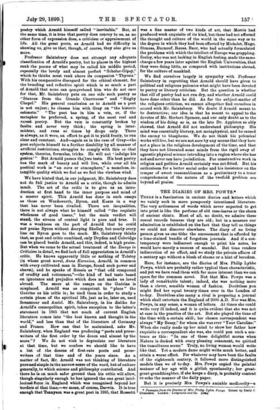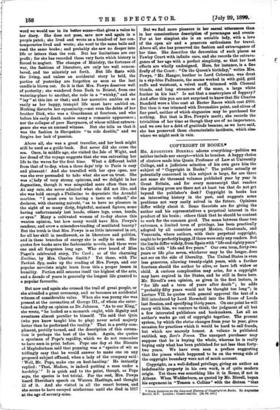THE DIARIES OF MRS. POWYS.*
THERE is a fascination in ancient diaries and letters which we vainly seek in more pompously intentioned literature. The very artlessness of words which never expected to get into print is like the perfume of old rose-leaves or the sheen of ancient chintz. Most of all, no doubt, we admire these casual records because they are old ; but in a measure our admiration is established on the fact that they tell us things we could not discover elsewhere. The diary of no living person gives us one tithe the amusement that is afforded by a time-stained bundle of forgotten journals. And if a con- temporary were indiscreet enough to print his notes, he would have merely a success of scandal. But time renders indiscretion of no effect, and we study the private affairs of a century ago without a blush of shame or a hint of boredom.
Here, for instance, are the diaries of Mrs. Philip Lybbe Powys, which are probably rather typical than characteristic, and yet we have read them with far more interest than we can spare for the common novel. Not that Mrs. Powys was a lady of remarkable talent ; indeed, she was nothing more than a clever, sensible woman of fashion. Doubtless you might find her equal twenty times over in the London of to-day. Doubtless also many a rival is preparing a journal which shall entertain the England of 2000 A.D. Nor was Mrs, Powys, in any sense, a woman of letters. At times she could write very ill indeed, and it is quite evident that she was not at ease in the practice of the art. But she played the tune of the time with a certain skill ; her chosen correspondent was always " My Bessy," for whom she was ever "Your Caroline." When she really made up her mind to show her father how exquisite a correspondent she was, she could pen such a sen- tence as this : "In one of those delightful morns when Nature is decked with every pleasing ornament, we quitted the tumultuous scene." Truly, no living woman would write like that. Yet a modern dame might write much better, and attain a worse effect. For whatever may have been the faults of the eighteenth century, it followed more distinguished models than we of to-day. Mrs. Powys copied the palatial manner of her age with a .girlish spontaneity ; her great- great-granddaughter, if she keeps a diary, is probably content to echo the manner of the daily paper.
But it is precisely Mrs. Powys's amiable mediocrity—a
• Passages from the Diaries of Mrs. Philip Lyt,',A Powys. Edited by Emily J. Climensou. Loudon : Loogulaus and Cu. L15a4
word we would use in its better sense—that gives a value to her diary. She does not pose, save now and again in a purple patch; she lived and wrote as a hundred of her con- temporaries lived and wrote; she went to the same balls and read the same books ; and probably she saw no deeper into life or letters than the rest. But her limitations are our profit ; for she has recorded those very facts which history is forced to neglect. The changes of Ministry, the fortunes of war, the fashions of literature, are only too well remem- bered, and too minutely set forth. Bnt life fleets with the living, and unless an accidental story be told, the parties of yesterday are forgotten as soon as the last candle is blown out. So it is that Mrs. Powys deserves well of posterity ; she wandered from Bath to Bristol, from one watering-place to another, she rode in a " whisky," and she " lay " at this inn or that ; and her narrative ambles on as easily as her happy, tranquil life must have ambled on. Nothing disturbs her equanimity,—not even the debts of her brother Dick, who was a Guardsman at fourteen, and who before his early death makes many a romantic appearance ; nor the collapse of poor Barrymore, of whose wildest extrava- gance she was an amused witness. But she tells us that it was the fashion in Shropshire "to ride double," and we forgive her lack of passion.
Above all, she was a great traveller, and her book might still be used as a guide-book. But never did she cross the sea. Once, in middle age, she visited the Isle of Wight, and her dread of the voyage suggests that she was entrusting her life to the waves for the first time. What a different habit from that of to-day, when a three days' trip to Paris is easy and pleasant ! And she travelled with her eyes open, nor was she ever persuaded to take what she saw on trust. She was lady of very strong opinions, and we delight in her dogmatism, though it was misguided more often than not. At any rate, she never admired what she did not like, and she was bold enough a Philistine to depreciate the Arundel marbles. " I must own to having a taste so refined," she declares, with charming naiveté, " as to have no pleasure in the sight of so many dirty, frightful, maimed figures, some having unfortunately lost heads, others legs, arms, hands, or eyes." Many a cultivated woman of to-day shares this wanton opinion, but bow many would have Mrs. Powys's candour, and avow a misunders tending of mutilated beauty ? But the truth is that Mrs. Powys is as little interested in art, for all her skill in needlework, as in literature and politics, and in these branches of energy she is sadly to seek. She quotes few books save the fashionable novels, and these were one and all forgotten long ago. Who ever heard of Miss Paget's celebrated story, The Card ; or of the charming Emiline, by Mrs. Charles Smith ? Yet these, with The Turkish Spy, make up the reading of Mrs. Powys, and our popular novelists might learn from this a proper lesson in humility. Fiction still esteems itself the highest of the arts, and a decade of years is generally the longest life granted to a popular favourite.
But now and again she crossed the trail of great people, or she attended a great ceremony, and so becomes an accidental witness of considerable value. When she was young she was present at the coronation of George III,, of whom she enter- tained as lofty an opinion as Dr. Johnson. "As to our King," she wrote, "he looked as a monarch ought, with dignity and sweetness almost peculiar to himself. 'Tis said that Quin (who you know taught him to play) never acted majesty better than he performed the reality." That is a pretty com- pliment, prettily turned, and the description of this corona- tion is perhaps the best of the book. Again, she quotes a specimen of Pope's rapidity, which we do not remember to have seen in print before. Pope one day at the Blounts of Mapledarham said that punning was a " species of wit so triflingly easy that he would answer to make one on any proposed subject offhand, when a lady of the company said: Well, Mr. Pope, make one on keel-hauling.' He instantly replied : That, Madam, is indeed putting a man under a hardship.'" It is quick and to the point, though, as Pope says, the species is but trivial. For the rest, Mrs. Powys heard Sheridan's speech on Warren Hastings, and thought ill of it. And she visited in all the smart houses, and she seems to have escaped misfortune until she died in 1817 at the age of seventy-nine.
But we find more pleasure in her casual utterances than in her conscientious description of personages and events. For at her simplest she is an amiable lady, with a love of the open air and a generous enthusiasm for travel. Above all, she has preserved the fashion and extravagance of her time. She describes the decoration of such places as Fawley Court with infinite care, and she records the extrava- gance of her age with a perfect simplicity, so that her best effects are wholly undesigned. Here, for instance, is a fine firefly of the Court : "On the Queen's birthday," writes Mrs. Powys, " Mr. Hanger, brother to Lord Coleraine, was drest in a sky-blue Paduasoie, the seams worked in with gold, gold cuffs and waistcoat, a velvet muff, trimmed with Cheneal blonde, and long streamers of the same, a large white feather in his hat." Is not that a masterpiece of foppery? And after this you are not surprised to know that Sir Charles Bamfield wore a blue coat at Exeter Races which cost £800. But then it was trimmed with Devonshire point, and olives of fine pearl, neither of which elegancies may be purchased for nothing. But that is Mrs. Powys's merit; she records the trivialities of her time as though they are of no importance, and we owe her a debt of gratitude because, as we have said, she has preserved these characteristic incidents, which else- where we might seek in vain.



































 Previous page
Previous page